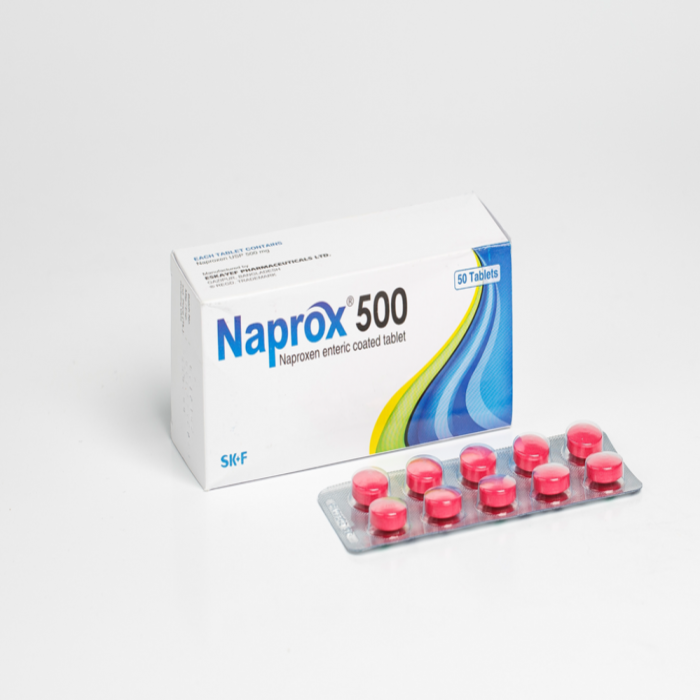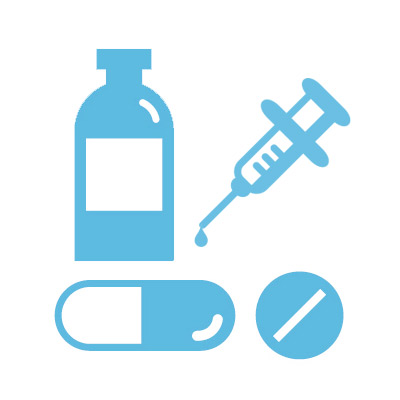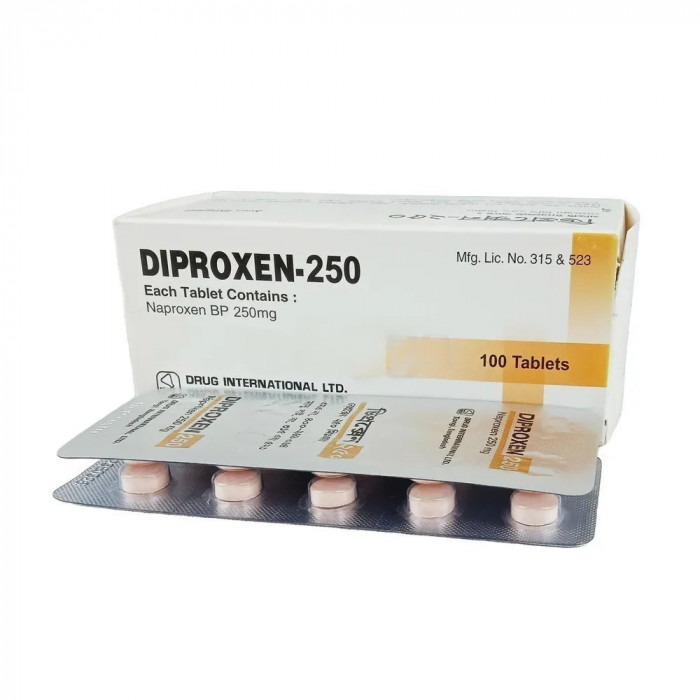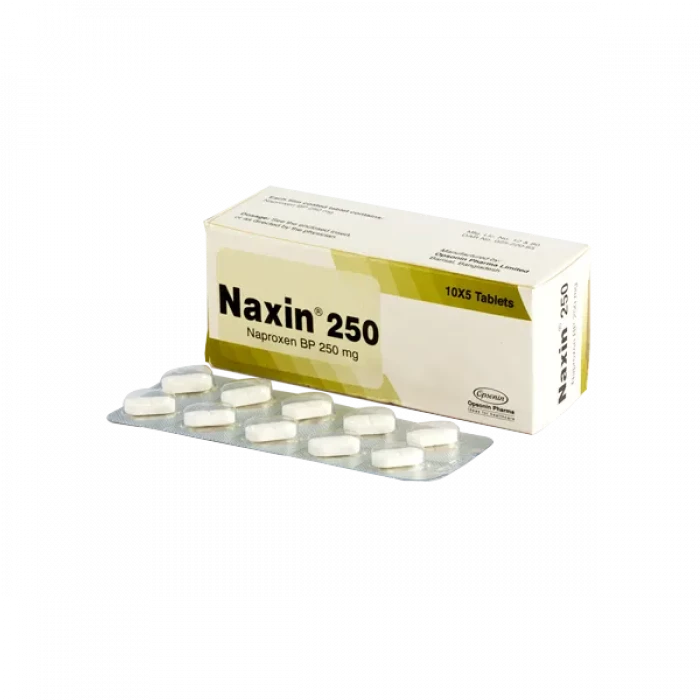
✔ 100% Authentic Product
👁️ Currently Viewing 2296
Tablet Manufacturer/Distributor: Opsonin Pharma Limited Generic Name: Naproxen 500 mg Tablet
Discount
Price: ৳ 86
MRP:
৳
90.3
5%
Off

100% Genuine Products, Guaranteed

Safe & Secure Payments, Always

Fast, Secure & Efficient Delivery

Proper Packaging
 Cash on Delivery - All over Bangladesh
Cash on Delivery - All over Bangladesh Regular Delivery - 12-24 Hours, Dhaka City* Charge Tk.39-59
Regular Delivery - 12-24 Hours, Dhaka City* Charge Tk.39-59 Regular Delivery - 24-48 Hours, Other Cities* Charge Tk.99-110
Regular Delivery - 24-48 Hours, Other Cities* Charge Tk.99-110
🌙 রমযান অফার 🌙
 ফ্রি ডেলিভারিঃ - ৭৯৯ টাকা+ অর্ডারে, ঢাকা
শহরে
ফ্রি ডেলিভারিঃ - ৭৯৯ টাকা+ অর্ডারে, ঢাকা
শহরে ফ্রি ডেলিভারিঃ - ২৭৯৯ টাকা+ অর্ডারে, ঢাকার
বাহিরে
ফ্রি ডেলিভারিঃ - ২৭৯৯ টাকা+ অর্ডারে, ঢাকার
বাহিরে
📲 মোবাইল অ্যাপ অর্ডারে সাশ্রয় বেশী
-
Google Play Store থেকে ডাউনলোড
-
Apple Store থেকে ডাউনলোড
100% Genuine Products, Guaranteed
Safe & Secure Payments, Always
Fast, Secure & Efficient Delivery
Proper Packaging
 Cash on Delivery - All over Bangladesh
Cash on Delivery - All over Bangladesh Regular Delivery - 12-24 Hours, Dhaka City* Charge Tk.39-59
Regular Delivery - 12-24 Hours, Dhaka City* Charge Tk.39-59 Regular Delivery - 24-48 Hours, Other Cities* Charge Tk.99-110
Regular Delivery - 24-48 Hours, Other Cities* Charge Tk.99-110 ফ্রি ডেলিভারিঃ - ৭৯৯ টাকা+ অর্ডারে, ঢাকা
শহরে
ফ্রি ডেলিভারিঃ - ৭৯৯ টাকা+ অর্ডারে, ঢাকা
শহরে ফ্রি ডেলিভারিঃ - ২৭৯৯ টাকা+ অর্ডারে, ঢাকার
বাহিরে
ফ্রি ডেলিভারিঃ - ২৭৯৯ টাকা+ অর্ডারে, ঢাকার
বাহিরে- Google Play Store থেকে ডাউনলোড
- Apple Store থেকে ডাউনলোড
🌙 রমযান অফার 🌙
📲 মোবাইল অ্যাপ অর্ডারে সাশ্রয় বেশী
✅ Description:
Indications
Rheumatoid arthritis, osteoarthritis, ankylosing spondylitis, juvenile arthritis, tendonitis, bursitis, and acute gout are among the conditions for which naproxen is prescribed. It's also used to treat pain and dysmenorrhea in women with primary dysmenorrhea.
Pharmacology
Naproxen is an anti-inflammatory, analgesic, and antipyretic non-steroidal anti-inflammatory drug (NSAID). It is quickly absorbed from the gastrointestinal tract and has a bioavailability of 95%.
Administration & Dosage
Naproxen Tablet-
Rheumatoid arthritis, osteoarthritis and ankylosing spondylitis: The usual dose is 500-1000 mg daily in two divided doses after meals.
Management of pain, primary dysmenorrhea, acute tendonitis & bursitis: Recommended starting dose is 500 mg followed by 500 mg every 12 hours or 250 mg every 6-8 hours. The initial total daily dose should not exceed 1250 mg and thereafter, the total daily dose should not exceed 1000 mg.
Acute gout: Recommended starting dose is 750 mg followed by 250 mg every 8 hours until the attack has subsided.
Naproxen Suspension-
For Juvenile rheumatoid arthritis: The usual dose for children over 2 years is 10 mg/kg/day given as two divided doses at 12-hours intervals. Therapy in children under 2 years of age is not recommended.
Naproxen Gel-
Is to be applied 2-6 times a day as required and is not recommended for use in children.
Interaction
Expert inhibitors: decrease the antihypertensive impact of Pro inhibitors. Antacids & Sucralfate: delay the assimilation of Naproxen. Aspirin: increment unfavorable effects. Diuretics: diminish the natriuretic impact of Furosemide and Thiazides. Methotrexate: improve the harmfulness of Methotrexate. Warfarin: increment the hazard of GI bleeding. Selective Serotonin Reuptake Inhibitors (SSRI): increment the chance of GI dying.
Contraindications
Patients who have a known hypersensitivity to naproxen should avoid taking it. Patients who have had asthma, urticaria, or allergic-type reactions after taking aspirin or other NSAIDs should not take it. In the setting of coronary artery bypass graft (CABG) surgery, it is contraindicated for the treatment of perioperative pain.
Side Effect
The following are the most commonly reported side effects:
Heartburn, abdominal pain, nausea, diarrhea, and dyspepsia are all symptoms of gastrointestinal problems.
Headache, vertigo, and drowsiness are symptoms of the Central Nervous System.
Pruritus (itching) and purpura are two dermatological conditions.
Edema and palpitation are symptoms of cardiovascular disease.
Other symptoms include visual and auditory disturbances.
Pregnancy & Lactation
Naproxen is classified as a pregnancy category C by the US Food and Drug Administration. So, unless the potential benefits to the other outweigh the potential risks to the fetus, Naproxen should be avoided during pregnancy and lactation.
Precautions & Warnings
In patients with epilepsy (avoid if poorly controlled, discontinue if convulsions develop), concurrent electroconvulsive therapy (prolonged seizures reported with fluoxetine), history of mania, cardiac disease, diabetes mellitus, angle-closure glaucoma, concomitant use of drugs that increase bleeding risk, and history of bleeding disorders, SSRIs should be used with caution.
Therapeutic Class
Non-steroidal anti-inflammatory drugs, drugs for osteoarthritis, drugs for rheumatoid arthritis (NSAIDs)
Storage Conditions
Protect from light and moisture by storing below 30°C. Keep the medicine out of children's reach.
⚠️Disclaimer:
At ePharma, we’re committed to providing accurate and accessible health information. However, all content is intended for informational purposes only and should not replace medical advice from a qualified physician. Please consult your healthcare provider for personalized guidance. We aim to support, not substitute, the doctor-patient relationship.























